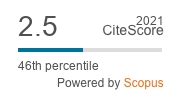ON APPLYING SPARSE AND UNCERTAIN INFORMATION TO ESTIMATING THE PROBABILITY OF FAILURE DUE TO RARE ABNORMAL SITUATIONS
Abstract
Estimating the probability of failure due to a rare and abnormal situation may face the need to deal with information which is incomplete and involves uncertainties. Two sources of information are applied to this estimating: a small-size statistical sample and a fragility function. This function is used to express aleatory and epistemic uncertainties related to the potential failure. The failure probability is estimated by carrying out Bayesian inference. Bayesian prior and posterior distributions are applied to express the epistemic uncertainty in the failure probability. The central problem of probability estimating is formulated as Bayesian updating with imprecise data. Such data are represented by a set of continuous epistemic probability distributions of fragility function values related to elements of the small-size sample. The Bayesian updating with the set of continuous distributions is carried out by discretising these distributions. The discretisation yields a new sample used for updating. This sample consists of fragility function values which have equal epistemic weights. Several aspects of numerical implementation of the discretisation and subsequent updating are discussed and illustrated by two examples.
Downloads
Published
Issue
Section
License
Copyright terms are indicated in the Republic of Lithuania Law on Copyright and Related Rights, Articles 4-37.





